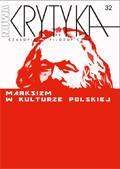Engels i Tołstoj. Podmiotowość w epoce wojny totalnej
Engels and Tolstoy. Subjectivity in the epoch of total war
Author(s): Michał SokolskiSubject(s): Philosophy
Published by: Wydawnictwo Naukowe Uniwersytetu Szczecińskiego
Keywords: Friedrich Engels; Lev Tolstoy; philosophy of war; absolute war; subjectivity; courage
Summary/Abstract: The purpose of this article is to compare the philosophical insights on war offered in the writings of Friedrich Engels and Lev Nikolayevich Tolstoy. Their views are treated as two different but complementary approaches to solve the problem of relation between the absolute and the real war, as posed by Carl von Clausewitz. According to Clausewitz, the armed forces, including the supporting civilian facilities, could be treated as a sort of "war machine" which, in the time of peace, remains under the control of political institutions. At the outbreak of war, the army apparatus tends to gain self-reliance, directing more and more to its own imperative: "destroy the enemy at all costs". This process is greatly facilitated by the prolonged lack of conclusive victory by either of warring parties. As a result, a "real war", which was started to accomplish some political goal, is gradually turning into an "absolute war", which is the aim in itself. Both Engels and Tolstoy offered a series of in-depth analysis of the phenomenon of selfempowerment of "war machine". In the conclusion, both perspectives are analyzed in terms of Althusserian theory of ideology, which offers the coherent theoretical frame allowing to propose some potentially fruitful practical directives.
Journal: Nowa Krytyka: czasopismo filozoficzne.
- Issue Year: 2014
- Issue No: 32
- Page Range: 163-184
- Page Count: 22

